多模态网络中的拥堵定价:深度强化学习的应用
IF 7.6
1区 工程技术
Q1 TRANSPORTATION SCIENCE & TECHNOLOGY
Transportation Research Part C-Emerging Technologies
Pub Date : 2025-05-28
DOI:10.1016/j.trc.2025.105166
引用次数: 0
摘要
开发一种实时动态定价机制,在考虑需求弹性和旅客异质性的同时,主动生成收费概况,仍然是一项重大挑战。现有的许多方法存在可移植性较低的问题,并且严重依赖于对临界积累等网络参数的精确估计。本研究引入了一个数据驱动的、基于警戒线的定价框架,使用强化学习来优化交通流量并解决这些限制。开发了一种基于行程的多模式宏观基本图(MFD)仿真,能够捕获单个模式选择决策。旅行者异质性是通过出发地和目的地、旅行长度、出发时间和时间价值(VoT)的变化来解决的。为了建立一个收费策略,使网络流量最大化(使总旅行时间最小化),并主动解决交通拥堵问题,引入了双深q网络(DDQN)代理。值得注意的是,在不事先知道网络参数的情况下,智能体成功地将汽车积累调节到临界水平,以最大化网络流出。敏感性分析表明,即使输入数据的误差幅度为20%,代理仍然有效地缓解拥塞。此外,通过引入不同的需求曲线和MFD系数,评估了智能体在各种交通条件和动态下的可转移性,证明了其稳健的性能。在所有场景中,与反馈控制器的基准比较进一步证实了DDQN代理始终表现出色。本文章由计算机程序翻译,如有差异,请以英文原文为准。
Congestion pricing in multi-modal networks: An application of deep reinforcement learning
Developing a real-time dynamic pricing mechanism that proactively generates toll profiles while incorporating demand elasticity and travellers’ heterogeneity remains a significant challenge. Many existing approaches suffer from low transferability and rely heavily on precise estimation of network parameters such as critical accumulation. This study introduces a data-driven, cordon-based pricing framework using reinforcement learning to optimise traffic flow and address these limitations. A multi-modal, trip-based Macroscopic Fundamental Diagram (MFD) simulation has been developed, capable of capturing individual mode choice decisions. Traveller heterogeneity is addressed through variations in origin and destination, trip length, departure time, and value of time (VoT). To establish a tolling strategy that maximises network outflow (minimises total travel time) and proactively addresses traffic congestion, a Double Deep Q-Network (DDQN) agent has been introduced. Remarkably, without prior knowledge of network parameters, the agent successfully regulates car accumulation at critical levels to maximise network outflow. Sensitivity analysis reveals that even with a 20% margin of error in input data, the agent remains effective in mitigating congestion. Additionally, the agent’s transferability has been evaluated under various traffic conditions and dynamics by introducing different demand profiles and MFD coefficients, demonstrating robust performance. Benchmark comparisons with a feedback controller across all scenarios further confirm that the DDQN agent consistently outperforms.
求助全文
通过发布文献求助,成功后即可免费获取论文全文。
去求助
来源期刊
CiteScore
15.80
自引率
12.00%
发文量
332
审稿时长
64 days
期刊介绍:
Transportation Research: Part C (TR_C) is dedicated to showcasing high-quality, scholarly research that delves into the development, applications, and implications of transportation systems and emerging technologies. Our focus lies not solely on individual technologies, but rather on their broader implications for the planning, design, operation, control, maintenance, and rehabilitation of transportation systems, services, and components. In essence, the intellectual core of the journal revolves around the transportation aspect rather than the technology itself. We actively encourage the integration of quantitative methods from diverse fields such as operations research, control systems, complex networks, computer science, and artificial intelligence. Join us in exploring the intersection of transportation systems and emerging technologies to drive innovation and progress in the field.

 求助内容:
求助内容: 应助结果提醒方式:
应助结果提醒方式:


